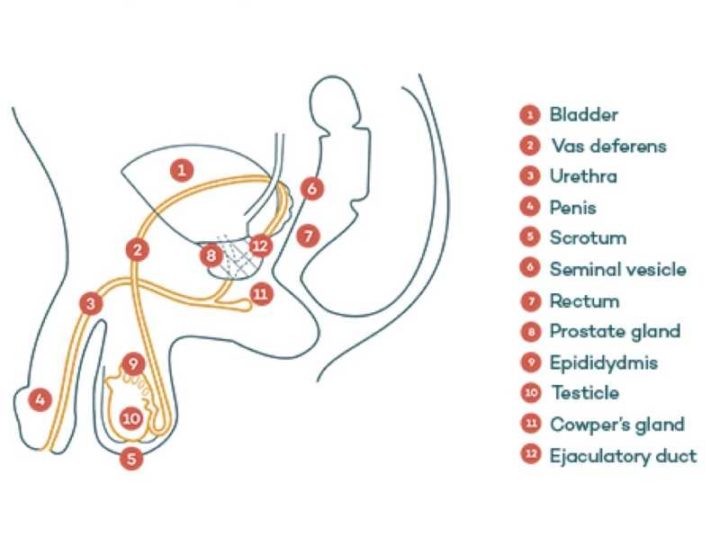What is male infertility?
Having a baby is generally a simple and natural experience. However, for some couples it can be difficult to conceive a child.
As a male, your fertility generally depends on the quantity and quality of your sperm. If the number of sperm you ejaculate is low, or if the sperm are of a poor quality, it will be difficult, and in some cases impossible, to get pregnant.
If you’ve been trying to get pregnant without success for a period of 12 months, and you’ve been having sex at least twice a week, it’s worth visiting the doctor. If you’re aware of factors that could have an impact on your chances of conceiving a baby, it’s a good idea to seek help earlier on. Both you and partner should be tested for reproductive problems at the same time.
Find out more about semen analysis and sperm health.
How common is infertility?
Infertility is a widespread issue. For about 20% of infertile couples, the problem is only in the male partner. For about 30% of couples the problem is in both partners. Therefore, the man contributes to infertility in around half of all cases.
About one in 20 men have low numbers of sperm, causing infertility. However, only about one in every 100 men have no sperm at all.
What are the symptoms of male infertility?
In most cases, there are no obvious signs of infertility. You’ll usually have no difficulty with sexual activity, erections and ejaculation, and your semen will look normal to the naked eye. You’ll need medical tests to help find out the cause of the infertility.
What causes male infertility?
Infertility can be caused by problems that affect sperm production or how the sperm travels. There are medical tests that can help work out the cause.
About two-thirds of infertile men have a problem where they make low numbers of sperm and/or sperm that don’t work properly.
About one in five infertile men have other physical problems, including those who’ve had a vasectomy but now want to have children. Blockages (often called obstructions) in the tubes leading from the testicles to the penis can stop you ejaculating sperm.
Other less common causes of infertility include:
- Sexual problems that affect whether semen is able to enter the vagina (one in 100 infertile couples)
- Low levels of hormones made in the pituitary gland (a hormone controller in the brain) that affect the testicles (one in 100 infertile men)
- Sperm antibodies (proteins that fight against sperm, which are found in one in 16 infertile men). In most men, sperm antibodies will not affect the chance of a pregnancy, but in some cases, it can reduce your fertility.
Sometimes, male infertility is simply genetic.
What are the genetic causes of male infertility?
Some changes to chromosomes or gene mutations can cause infertility because they harm sperm production or block the flow of sperm.
The most common genetic causes of infertility are chromosomal conditions that affect the way that sperm is produced. These include:
- Klinefelter syndrome (a condition where you’re born with an extra X chromosome)
- Y chromosome deletions (a condition where you have genetic material missing from your Y chromosome that is important for sperm production)
- Other genetic problems, such as Down syndrome.
Infertility can be due to mutations (DNA changes) in single genes, although it’s far less common.
We think that other genetic conditions will be discovered in the future that will help explain other sperm production problems with no known cause.
What can I do if I’m worried about my fertility?
If you’ve been trying for a pregnancy for 12 months without success, the best thing both you and your partner can do is visit your doctor or family planning clinic.
Infertility is a couple’s problem. Even if one partner has a child from another relationship, both partners should get tests done. Infertility can be a sign that you have other (possibly undiagnosed) health problems, so it’s important that you get it checked out.
How is infertility diagnosed?
Your doctor will usually ask for your medical history, conduct a physical examination and do a semen analysis. This will check the number, shape and movement of your sperm. They might also take a blood test to check the levels of hormones that control sperm production or for genetic testing.
In some cases, your doctor will test your urine to see if sperm are present, which can occur when there is retrograde ejaculation . Sometimes your doctor will recommend an ultrasound, MRI, or a testicular biopsy, which is a small surgery to remove tissue for testing.
What are the treatments for infertility?
One in eight infertile men have a treatable condition, and after treatment, couples can become pregnant naturally.
In some cases, your doctor will recommend that you and your partner seek assisted reproductive treatment (used to achieve pregnancy), such as in vitro fertilisation (IVF). These methods don’t cure or treat the cause of infertility, but they can help you and your partner get pregnant, even if your sperm count is very low.
At this stage, there are no treatments to fix genetic causes of infertility. For those who can’t father children naturally, assisted reproductive treatment offer the best chance for you to have biological children.
Can I do anything to prevent male infertility?
There are a number of things that can harm the production of sperm, so it’s best to avoid:
- Smoking cigarettes
- Drinking excess alcohol
- Catching sexually transmitted infections
- Heat stress from tight fitting underwear
- Anabolic steroids taken for body building or sporting purposes.
If you work somewhere that may affect your fertility, it’s important to wear protective clothing and to follow all occupational health and safety guidelines. We also recommended that couples trying to conceive stay away from harmful chemicals.
Because of the possible effects on fertility, it’s important to tell your doctor if you have had hormone treatment; or had surgery as a child to fix undescended testes.
Can older age cause male fertility problems?
Healthy men in their 70s and beyond can still father children, although if you’re middle-aged or older, it usually takes longer for your partner to become pregnant. This might be because of less sexual activity, lower semen volume, changes to sperm movement, a lower number of properly working sperm, or possibly lower sperm function and DNA quality.
The chance of the child having some genetic or chromosomal problem also gets higher when you get older.
How to cope with infertility
Finding out that you’re infertile is often a shocking and upsetting experience. There’s still a common but incorrect belief that infertility is a woman’s problem. Men are often unprepared when they’re told there is a complication with their sperm.
Fertility problems can affect a man’s sense of masculinity, sexuality and potency.
It’s normal to have an emotional reaction to infertility. Talking with a doctor, a sexual therapist or counsellor can often help with any negative feelings you might be having.
Turning to family, partners and friends for support can also help.
Your doctor’s appointment
Questions to ask your doctor:
- If my semen analysis comes back normal, will you do some other tests?
- Should I have a blood test of my reproductive hormones to make sure they are working properly?
- What lifestyle changes could help improve my sperm quality?
Things to think about before your appointment:
- How long have you and your partner been trying to conceive? Have you been having sex at least twice a week during this time?
- Do you and your partner focus on sex at the fertile time of the month and how do you know when that is?
- Did you have undescended testicles as an infant? Have you ever had pelvic surgery or treatments for cancer?
- Are you taking any prescribed/non-prescribed medications, recreational drugs, androgenic steroids?
Source: Healthy Male website – https://www.healthymale.org.au/mens-health/male-infertility





